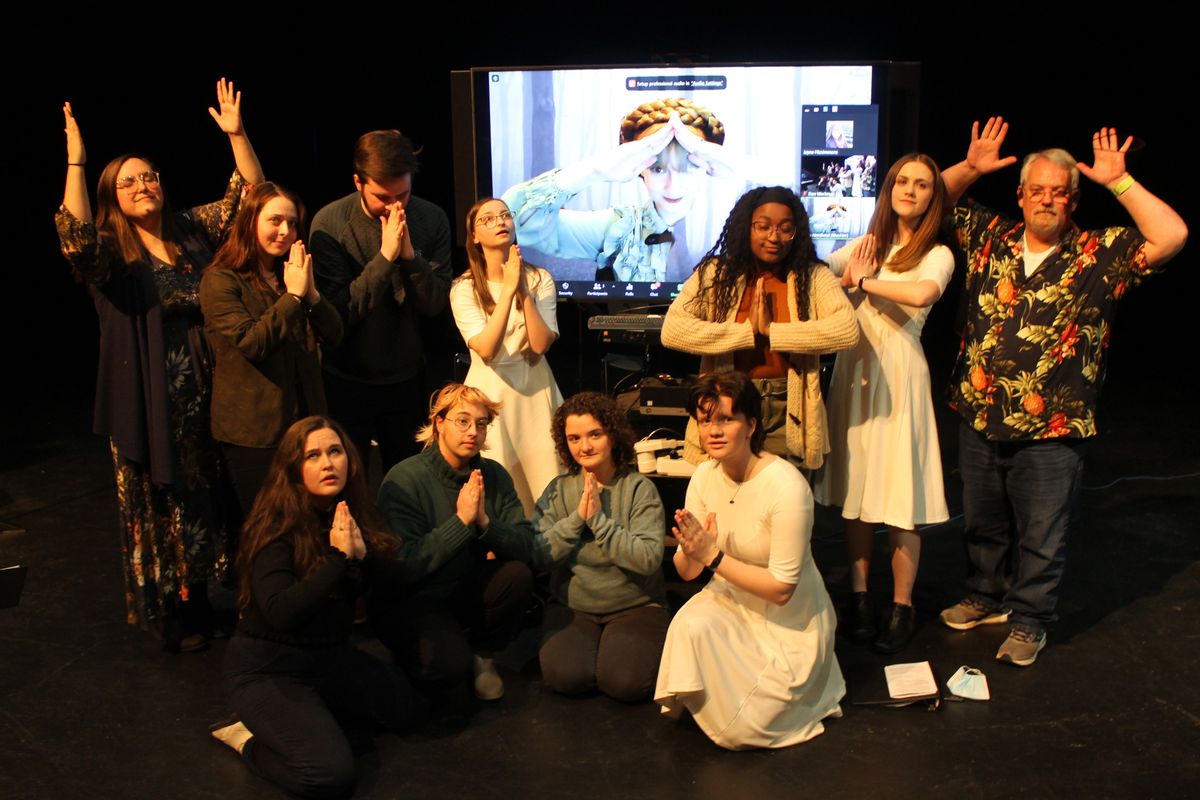Deities, presidents and magical beings mingle for biennial play festival

The Augustana theater community brought together new and old friends for a weekend of original performances in its biennial Claire Donaldson New Play Festival Feb. 25-27.
Theater professor Jayna Fitzsimmons said the festival provides a whole weekend dedicated to the new play development process.
“[I]t was important to me to feature student written work and to help make connections to our local and regional theatre communities,” Fitzsimmons said. “I also really wanted our students to have the experience of doing a 24-hour play. The condensed collaboration is really fun.”
Students, instructors and supporters alike joined the excitement of crafting and performing never-before-seen plays. The festival, since its founding over two decades ago in honor of the late Augustana graduate and playwright Claire M. Donaldson, has become a tradition.
In the spirit of showcasing new work, Nissa Nordland Morgan, the artistic director of the Twin Cities Horror Festival, was thrilled to give her permission for the performance of “Incarnate,” one of her latest works, for the opening night.
What ensued was a live reading that ensnared the audience into the mix, pushed to join in with cultic prayers and hymns led by the performers in this horror play.
The following evening, seven original short plays were performed, from house to stage — casted, rehearsed and troubleshooted all during the past week. Student actors and playwrights worked alongside local theater professionals in-class, or during what little free time they had, to meet the deadline and secure 10 minutes under the spotlight.
From playing with magic and murder to three deities presiding over humanity’s fate to a presidential race turned musical, the seven plays provided for a night full of the “weird and wonderful,” as Fitzsimmons described.
For some students like senior Elizabeth Dobbe, writing a short play allowed them to let their creativity convey a more personal message.
“The script is very special to me, as it was something I had written to help cope with the grief of losing my mother back in April. It was so lovely and emotional to see it brought to life by such wonderful people,” Dobbe said, referring to her submission for the festival, “Waiting in the Rain.”
The closing of the short plays on Saturday night led directly into preparation for the festival’s final event, known as Theatrical Genesis.
For the next 17 hours, participants worked throughout the night to write and rehearse a short play to be performed the next afternoon. Each team was responsible for its own technical elements of lighting, props, sound and set. Participants were not allowed to leave the theater during this time.
To top the event off, Theatrical Genesis included five challenges that required the teams to incorporate a randomly assigned prop, character, line of dialogue, style element and sound effect into their plays.
However, three of these challenges arrived later at predesignated times via email throughout the night. Most students got an average of an hour and a half of sleep.
For performance, the Theatrical Genesis teams seated themselves in the audience to await their turns.
Despite a long week of preparation and performances, ending with an exhausting rush to the finish line, Dobbe said the festival and tradition held a number of good memories and chances to learn.
“[The festival] is so important for writers at any point in their process,” Dobbe said. “A whole weekend just for new works, it’s so exciting, and there are so many ways to connect with the selections.”
Reflecting on the festival, Fitzsimmons said she looks forward to what the future may bring in terms of new work and her goal to continue exposing students to new opportunities.
“The new play festival is just a small part of that goal,” she said. “We have a new play development class. We have a wonderful ongoing collaborative partnership with playwright and translator, Richard Swanson.”
According to Fitzsimmons, not all theater programs place this kind of emphasis on new work. Having the festival gives students a special opportunity to practice skills necessary for theater work in their careers beyond university.
SEE NEXT: ‘The 39 Steps’ theater performance debut: here’s what to expect



